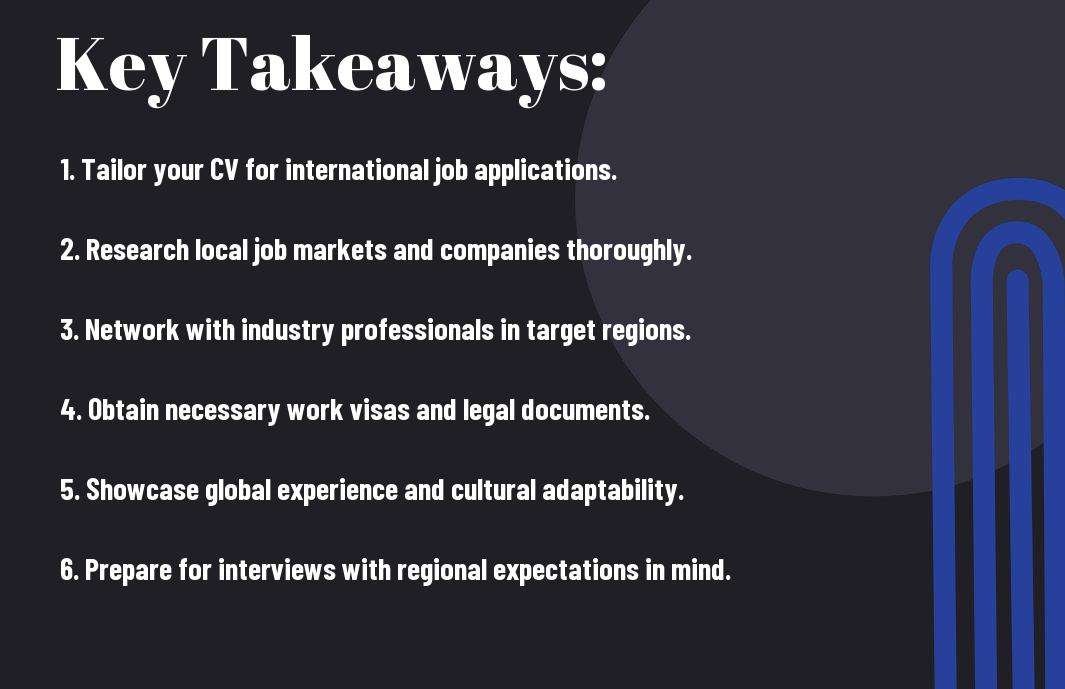Australia and Europe are thriving markets for product directors, offering exciting job opportunities that can significantly enhance your career. If you’re looking to expand your horizons, it’s important to navigate the job market effectively. In this post, we will guide you through 7 practical steps that will equip you with the imperative skills and knowledge needed to successfully secure a position abroad. By focusing on strategic networking, understanding local job requirements, and enhancing your cultural adaptability, you can increase your chances of landing the perfect overseas role.
Key Takeaways:
- Targeted Networking: Build connections with professionals in your desired region to increase job opportunities.
- Cultural Familiarity: Understand the workplace culture in Europe and Australia to better align your applications with local preferences.
- Tailored Applications: Customize your resume and cover letter for each job, highlighting relevant experience and skills that match the specific market.

Understanding the International Job Market
The international job market offers diverse opportunities, but you need to navigate it strategically. By researching specific industries, local job boards, and networking opportunities in your targeted regions like Europe and Australia, you can gain insights into the current landscape. It’s important to understand regional economic conditions, work cultures, and the unique demands of potential employers, as these factors can significantly impact your job search success.
Key Differences Between Regions
Against the backdrop of a global economy, you will find that each region presents unique challenges and opportunities. For instance, the job market in Europe is often influenced by the European Union’s regulations and economic stability, while Australia has its own distinct labor laws and a strong emphasis on work-life balance. Understanding these key differences can prepare you for a smoother transition into your desired location.
In-demand Skills and Roles
Among the various skills and roles in demand, product management expertise is highly sought after. Companies are particularly looking for candidates who are adept at agile methodologies, user experience design, and data analytics. As you position yourself for overseas opportunities, highlighting these skills in your resume can significantly enhance your appeal to prospective employers.
Understanding the landscape of in-demand skills and roles is fundamental to your job search. Many employers are focusing on digital transformation, thus product directors with expertise in emerging technologies such as AI, machine learning, and cloud computing are highly valued. Similarly, roles that emphasize cross-functional collaboration and strategic decision-making present significant opportunities. Being aware of industry trends and continuously developing your skills will position you favorably in a competitive market.
Networking Strategies for Success
One of the most effective ways to land a job overseas is through networking. Establishing a strong network can significantly enhance your visibility in the competitive job market. Attend industry events, workshops, and conferences relevant to your expertise. Engage with professionals online and offline, as these connections can provide valuable insights into job openings and employer expectations. Your network is not just a source of referrals; it’s a platform for learning and sharing experiences that can open doors for your international career.
Building Relationships in Target Countries
Around the globe, establishing relationships in your target countries can set you apart from other candidates. Spend time understanding cultural nuances and professional etiquette specific to each location. Reach out to local professionals through social media or mutual connections to create meaningful dialogues. Doing so not only aids in tapping into the hidden job market but also allows you to gain firsthand insights about the work environment, industries, and opportunities available in those regions.
Leveraging Online Platforms
Below, utilizing online platforms can profoundly impact your job search process. Engaging on platforms like LinkedIn, professional forums, and specialized job boards will help you connect with decision-makers and industry peers. Join relevant groups and participate in discussions to showcase your expertise and stay informed about market trends. Cultivating a recognizable online presence empowers you to access opportunities widely while sharing your unique value proposition with potential employers.
Success in leveraging online platforms requires an active and strategic approach. Keep your LinkedIn profile updated, highlighting your achievements and skills relevant to the roles you seek in Europe and Australia. Use online forums to engage with industry communities, asking questions and offering insights can bolster your credibility. As you participate in discussions, pay attention to opportunities for collaboration or referrals. By strategically showcasing your professional capabilities, you position yourself as an appealing candidate and increase your chances of securing your dream job overseas.
Tailoring Your Resume and Cover Letter
Keep your resume and cover letter specific to the job you are applying for. Highlight the skills and experiences that directly align with the position and company culture. This not only showcases your qualifications but also demonstrates your interest in the role. For insights on how to tailor your application for high-paying opportunities, check How to get a high paying product management job abroad.
Cultural Considerations in Application Materials
For overseas applications, it is vital to understand and incorporate the cultural nuances of the country you’re targeting. Different countries have varying preferences in terms of formality, tone, and content in applications. Take time to research local practices to ensure your materials resonate well with prospective employers.
Highlighting Relevant Experiences
Beside tailoring your resume, it’s important to emphasize experiences that directly relate to the job description. Focus on achievements and responsibilities that align with the position, utilizing metrics where possible to demonstrate your impact.
For instance, if you have led a project that improved product performance by 20%, make sure this is prominently featured. Positioning such achievements not only validates your skills but also captures the attention of hiring managers. Highlight experiences that reflect cross-cultural collaboration or international market penetration, as these will be particularly relevant and appealing for roles based in Europe and Australia. This targeted approach helps you stand out as a candidate who is both qualified and adaptable to new environments.
Preparing for Interviews Abroad
Once again, as you prepare for interviews abroad, understanding the specific expectations and practices of the target country is vital. Research the company culture, common interview questions, and overall interview etiquette to ensure that you make a positive impression. Additionally, practicing your responses and getting comfortable with the format will help you exude confidence during the actual interview, increasing your chances of success.
Common Interview Formats in Europe and Australia
Between the diverse interview formats found in Europe and Australia, you may encounter a mix of traditional one-on-one interviews, panel interviews, and even technical assessments. It’s vital to adapt to these various formats to showcase your skills effectively. Be prepared for behavioral questions and consider using the STAR method (Situation, Task, Action, Result) to provide structured and clear responses.
Addressing Cultural Nuances
Common cultural nuances in Europe and Australia can significantly impact your interview experience. You should be aware of differences in communication styles, such as directness in feedback and personal space, as well as varying levels of formality. This understanding enables you to navigate the interview confidently while aligning with the expectations of your interviewers.
Also, understanding individualistic versus collectivistic cultures is vital. In more individualistic societies, like Australia, showcasing your personal achievements is important. Conversely, in some parts of Europe, emphasizing teamwork and collaboration may carry more weight. Be attentive to non-verbal communication, as a firm handshake and maintaining eye contact often signify confidence, while being overly enthusiastic might be viewed as less professional. Tailoring your approach to these cultural differences can enhance your chances of making a lasting impression.
Navigating Work Visa Processes
After identifying your target job market, you’ll need to navigate the work visa processes specific to that country. To streamline your job search and immigration steps, you can refer to the 8 Steps to Land a Job Abroad. Familiarize yourself with the visa types available and their requirements, as this will save you time and effort in your pursuit of overseas employment.
Overview of Visa Requirements
Processes for acquiring a work visa vary significantly by country, depending on factors such as your nationality, the job type, and local laws. You should research specific regulations in your desired destination—whether it’s Europe or Australia—to ensure compliance with all requirements. Each country will have different rules regarding sponsorship, skills assessments, and financial prerequisites that you need to meet before applying.
Resources for Assistance
Overview your options by utilizing both governmental and non-governmental resources to assist you with the work visa application process. Seek out immigration agencies, local consulates, and online forums where expatriates share their experiences. You can also explore professional networks and social media groups that focus on relocation; these platforms can provide insights and guidance to simplify your journey.
Understanding the *right resources* can make all the difference in your visa preparation. You should connect with *immigration experts* to get personalized advice tailored to your situation. You might find *online communities* where fellow expatriates share helpful tips and resources specific to your field. Engaging with *consulates* or *embassies* is also important, as they have up-to-date information on the *latest requirements* and possible changes that could affect your visa application process.
Maintaining a Global Mindset
Despite your local expertise, embracing a global mindset is imperative for navigating job opportunities in Europe and Australia. Exposure to international practices and diverse perspectives can enhance your leadership capabilities. You can explore how to get sponsorship jobs in Australia, which can further your journey toward global employment.
Embracing Cultural Differences
Below, understanding and respecting cultural differences can set you apart as a candidate. Each region possesses unique values that shape workplace dynamics. Familiarizing yourself with these nuances can foster relationships and ease your transition into overseas roles.
Continuous Learning and Adaptation
One of the key factors in landing overseas roles is your commitment to continuous learning and adaptation.
Due to the ever-evolving workplace environment and cultural diversities in Europe and Australia, it’s imperative to stay informed and adaptable. Industry trends, regulations, and consumer behaviors change, requiring you to update your skills and expand your knowledge. Engaging in professional development, attending workshops, and leveraging online resources can significantly enhance your employability and performance in diverse settings. This proactive approach not only showcases your value to potential employers but also increases your chances of successfully navigating international workplaces.

Final Words
Drawing together the insights from the 7 key steps, you can effectively navigate the path to securing overseas roles as a product director in Europe and Australia. By understanding regional market dynamics, enhancing your global network, honing your cultural awareness, and tailoring your job applications, you position yourself as a desirable candidate. Additionally, staying updated on industry trends and leveraging recruitment platforms will significantly boost your visibility. With strategic preparation and a proactive approach, you can successfully expand your career horizons and tap into exciting opportunities abroad.







